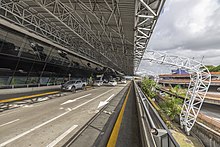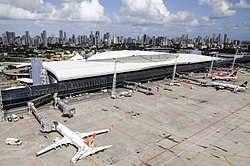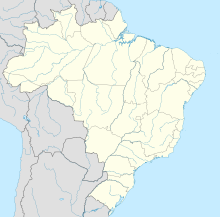|
Recife/Guararapes–Gilberto Freyre International Airport
Aeroporto Internacional do Recife/Guararapes–Gilberto Freyre (IATA: REC, ICAO: SBRF) is the airport serving Recife, Brazil. Since December 27, 2001 it is named after the Recife-born Anthropologist and Sociologist Gilberto de Mello Freyre (1900–1987).[5] Some of its facilities are shared with the Recife Air Force Base of the Brazilian Air Force. Since 2019 it is operated by AENA. HistoryOriginally called Ibura Airport, the airport had its name changed to Guararapes Airport in 1948. The facility originated during World War II, when a new airport was built to replace the earlier airfield, Parque do Encanta Moça. With the end of the War, the facility became strategically important as a technical and refueling stop on the route from South America to Europe. On July 21, 1953, within a law prescribing rules for the naming of airports, the name of the facility was officially and exceptionally maintained as Guararapes Airport.[6] On 18 January 1958, a new passenger terminal was inaugurated, replacing the original facility. During this time, runway 14/32 was extended from 1,800 to 2,010 m (5,910 to 6,590 ft), and runway 18/36 was extended from 1,800 m to 2,400 m (7,900 ft). In 1979, an agreement with Infraero was made in order to further develop the airport complex. The passenger terminal underwent its first major renovation in 1982, and another enlargement occurred in 1990. In 2004, a brand-new passenger terminal was built, including a new shopping mall, thus generating more traffic and revenue. Furthermore, a new concourse was opened in 2004, and the airport's capacity increased from 1.5 to 9 million passengers/year. Today, the runway is 3,300 meters (10,800 feet) long, the longest in Northeastern Brazil. On 31 August 2009, Infraero unveiled a BRL 8.75 million (US$4.6 million; EUR 3.2 million) investment plan to upgrade Guararapes International Airport, focusing on the preparations for the 2014 FIFA World Cup in Brazil, Recife being one of the venue cities. The investment was spent in finishing the passenger terminal renovation and installing eight more jetways.[7] The work was completed on 1 July 2011, and the airport was then considered ready for the FIFA Cup.[8] Responding to critiques to the situation of its airports, on May 18, 2011, Infraero released a list evaluating some of its most important airports according to its saturation levels. According to the list, Recife was considered to be in good situation, operating with less than 70% of its capacity.[9] Previously operated by Infraero, on March 15, 2019, AENA won a 30-year concession to operate the airport.[10] The Brazilian Integrated Air Traffic Control and Air Defense Center, section 3 (Cindacta III) is located in the vicinity of the airport.[11] The facility covers 319 hectares (788 acres) of land.[12] Airlines and destinationsPassengerNote: Cargo
Statistics   Following is the number of passenger, aircraft and cargo movements at the airport, according to Infraero (2007-2019) and AENA (2020-2023) reports:[15][16][1]
Accidents and incidents
AccessThe airport is located 14 km (9 mi) from downtown Recife. Recife's subway Airport Station is connected to the terminal by a footbridge. Besides main bus lines that serve the neighborhoods of Boa Viagem and Cidade Universitária, in Recife, and Piedade, in Jaboatão dos Guararapes. See alsoReferences
External linksWikimedia Commons has media related to Recife/Guararapes-Gilberto Freyre International Airport.
|
||||||||||||||||||||||||||||||||||||||||||||||||||||||||||||||||||||||||||||||||||||||||||||||||||||||||||||||||||||||||||||||||||||||||||||



